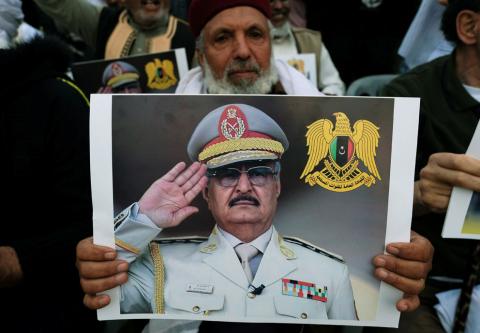Advertisement
U.N. Libya envoy says Haftar made coup attempt with advance on Tripoli
TRIPOLI (Reuters) - Eastern Libyan commander Khalifa Haftar tried to stage a coup by issuing an arrest warrant for Prime Minister Fayez al-Serraj, U.N. envoy Ghassan Salame said on Monday with Libya's top rivals locked in military confrontation over the capital Tripoli.
Haftar's eastern-based Libyan National Army (LNA) advanced to the outskirts of Tripoli almost two weeks ago, predicting defections and victory within two days.
However, Serraj's internationally-recognised government has managed to bog them down in southern suburbs, thanks largely to armed groups who have rushed to aid them from various western Libyan factions.
Haftar, a 75-year-old former general in the late dictator Muammar Gaddafi's army, has been building up troop numbers and intensifying air strikes in a campaign he is selling as necessary to restore order and eradicate jihadists.
But Salame, speaking to BBC radio, said Haftar's decision to issue in the course of his campaign arrest warrants for Serraj and other top Tripoli officials "sounded more like a coup than counter-terrorism".
Haftar's side confirmed the warrant had been issued and Serraj's government said it had been immediately rejected.
Diplomats believe Haftar for now faces no pressure to back off from backers including the United Arab Emirates, Egypt and France, who see him as the best bet to end the factional chaos plaguing Libya since Gaddafi's fall in a 2011 uprising.
Salame, whose plans for a national reconciliation conference this week had to be postponed because of the fighting, said he hoped both side will realise in the coming days that neither could achieve an outright military victory.
"We are in fact in a military stalemate since eight days, or nine days," Salame said, adding that both sides had carried out 30 air strikes each that had not changed the situation on the ground.
Air strikes and shelling have hit civilian infrastructure and residential homes, especially in the south of Tripoli where Haftar's forces have sought to penetrate government defences.
The U.N. humanitarian agency OCHA said targeting civilian facilities was a violation of international humanitarian law.
MOUNTING CIVILIAN CASUALTIES
The United Nations Libya mission UNSMIL also warned in a statement that "the bombing of schools, hospitals, ambulances and civilian areas is strictly prohibited", adding that it was documenting such cases for the U.N Security Council.
"We are concerned at the mounting civilian casualties, we are concerned at damage to vital civilian infrastructure," David Satterfield, U.S. Acting Assistant Secretary for the Near East affairs, told reporters in a conference call.
A school was hit on Saturday in an air strike blamed on Haftar's forces, Tripoli officials said.
Two missiles also struck education ministry warehouses late on Sunday, destroying 3.1 million school books, an official in the Tripoli government told Reuters. OCHA said in a tweet five million books and national exam results had been destroyed.
In another incident, Reuters reporters on Monday filmed a residential block in southern Tripoli that was hit by at least one rocket. Several families were inside during the strike but escaped with minor injuries. Children's shoes, bread and shards of the rockets lay on the floor of the dwelling.
Both sides have traded blame over shellings of residential districts.
More than 18,000 people have been displaced by the fighting, 2,500 alone in the past 24 hours, the U.N. migration agency said. Nearly 150 people, mostly combatants, have been killed, the World Health Organization said. More than 600 people have been wounded.
The U.N.-organised national reconciliation conference, planned long before Haftar's advance, had been intended to bring the two sides together to end the turmooil and plan an election.
No new date has yet been set.
Haftar has long said his declared mission is to restore order to the oil-producing North African country.
(Additional reporting by Stephanie Nebehay in Geneva, Hani Amara in Tripoli, Aidan Lewis in Cairo and Michelle Nichols at the United Nations; Writing by Ulf Laessing; Editing by Mark Heinrich)



















Add new comment